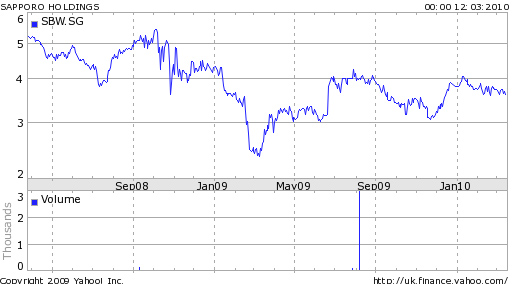U.S. shareholder criticises Sapporo management
The move is aimed at putting pressure on Sapporo’s management to revamp its strategy for the group, which has struggled to remain competitive in Japan’s declining beer market. The hedge fund claims that the current board has failed to implement an effective strategy to address Sapporo’s poor profitability.
Repeatedly, Steel Partners has urged Sapporo to increase returns by redeveloping its property portfolio, reviewing its soft-drink unit and improving the marketing of its beers. But to no avail. All of Steel Partners’ initiatives (the Japanese would probably call them “meddling”) have been blocked by the board while Sapporo’s fortunes continued to decline. In the year to December 2009, Sapporo suffered a 6 percent drop in sales and a 5 percent operating profits decline in its alcohol business, it was reported.
Sapporo’s answer to the dramatic shrinking of the domestic Japanese market, which has lost 15 percent in volume in the past decade, is increasing on-premise sales on the one hand and speeding up international expansion on the other. Sapporo entered the Vietnamese market in December 2009, when it purchased a 65 percent stake in Kronenbourg Vietnam for USD 25 million. Kronenbourg Vietnam is equally owned by Carlsberg and Vietnam National Tobacco Corp., or Vinataba. According to media reports, the joint venture which was set up in 2007 isn’t fully operational.
"Sapporo’s existing board and management team have been given a sufficiently long period of time to demonstrate the effectiveness of their (business) strategy, and we believe they have failed," Steel Partners is reported as saying.
Many would agree. Sapporo’s international expansion strategy still has to show its merits. Sapporo had a mere 25 billion yen (USD 284.5 million) in of sales outside Japan in 2008, even after the inclusion of Toronto-based Sleeman Breweries Ltd., which it bought in 2006. That made up 6 percent of Sapporo’s overall sales in 2008.
In its recent proposal Steel Partners has been seeking the support of other Sapporo shareholders to appoint six new directors to Sapporo’s board.
The Sapporo management board has repeatedly rejected its shareholder’s criticism as unfounded. In a recent press release it said the proposal contained “many untruths”, was “unreliable”, and, if approved at the Annual General Meeting, could “spoil our corporate value.”
It may have a point there. The Economist newspaper in its 13 March 2010 issue argues that rows at Japan’s boards are, at their root, “a reflection of the peculiar status of Japanese bosses. They are often mere figureheads who serve for a short time before handing the baton to other old company hands. Firms are run by consensus, not individuals. Indeed, the lifetime employment system makes bosses loath to rock the boat (and means they have few other job options if they do).”
Given such a strong consensus culture, it is small wonder that Japanese companies often show high turnover but meager profits.
Several market observers have suggested a merger of sorts to end Sapporo’s woes. The name Asahi seems to offer itself, but Asahi President Hiroshi Ogita denied that the company will merge with Sapporo: "There is no possibility that we’ll engage in an M&A with any domestic liquor company." Instead, the brewer is concentrating on increasing its stake in Tsingtao Brewery in China.
Whether Sapporo’s shareholders will follow the management’s lead or take up Steel Partners’ suggestions will be decided at Sapporo’s Annual General Meeting scheduled for 30 March 2010.

